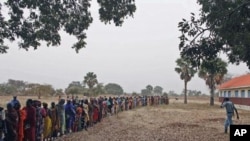South Sudanese who fled inter-tribal fighting in the past few days in Jonglei state are returning to their homes. The United Nations says humanitarian assistance is needed for those who were displaced by the conflict.
The United Nations says a group of about 6,000 young men from the Lou Nuer tribe have ceased their attack on the rival Murle people, and have retreated from the town of Pibor. The South Sudanese government says it is now in control of the area.
Tens of thousands of people fled the violence, which was the latest in a series of retaliatory attacks between the two groups.
U.N. Humanitarian Coordinator for South Sudan Lise Grande says many of those who have returned are visibly wounded and in need of aid.
“We can already see that they are going to need a lot of assistance," said Grande. "They are going to need food, they are going to need water, and we all have to consider that this is the top priority right now.”
Grande, who is currently in Pibor overseeing the humanitarian response, praised the government of South Sudan and the U.N. security mission in the country for preventing further bloodshed.
The U.N. mission deployed about 400 soldiers to keep the peace in Pibor while South Sudan mobilized an additional 3,000 soldiers and 800 police.
The international medical organization Doctors Without Borders, known by its French acronym MSF, is also planning to send an emergency medical team to help treat the wounded.
“So far, we have been hearing about a lot of casualties but still we expect a lot more injuries but we cannot tell exactly what injuries will be in the bush," said Sarathi Rajendran, the head of the MSF mission in South Sudan. "So it is important for these people, as soon as they come back, we need to provide massive medical care services.”
Militiamen attacked and looted two MSF facilities in Pibor and nearby Lekongole, and most of the group's 156 locally-hired staff fled for safety.
South Sudan's Council of Churches has been trying the mediate peace talks between the two tribes who have fought over cattle and territory for decades.
Reverend John Chol Dau, who provides program support for the peace process, is concerned about the rising level of violence between the two rival tribes.
“This is not normal, it is not about the cattle raiding anymore, because usually they used to - a few individuals would go and raid the other tribe and steal a few cows here and there," he said. "But at this time it has changed and the dynamic has changed into abduction of women and children and killing, massive killings, which has not been there.”
Reverend Dau says the violence intensified over the years as tribe members traded traditional weapons like spears for modern guns.
The Council of Churches has helped train negotiators from both tribes to discuss their grievances.
Dau says until the recent violence, the talks were showing signs of progress.
“They sat together, and so that shows the willingness the two tribes want to set," noted Dau. "Because they had about 14 negotiators from both sides who came and sat in Juba for about a week and they could sleep in one place and they could eat together and they felt that they really want to sit together and iron out things.”
Dau says mediators still hope to resolve the differences between the groups peacefully, and are planning a meeting of the negotiators this month if they can agree on a neutral venue.












